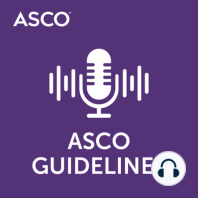12 min listen
Adjuvant Therapy for Resected Biliary Tract Cancer Guideline
FromASCO Guidelines
ratings:
Length:
9 minutes
Released:
Mar 11, 2019
Format:
Podcast episode
Description
An interview with Dr. Rachna Shroff from the University of Arizona Cancer Center on the guideline which provides recommendations on the role of post-operative therapy in patients who undergo surgical resection for biliary tract cancers. Read the full guideline at www.asco.org/gastrointestinal-cancer-guidelines The purpose of this podcast is to educate and to inform. This is not a substitute for professional medical care and is not intended for use in the diagnosis or treatment of individual conditions. Guests on this podcast express their own opinions, experience, and conclusions. The mention of any product, service, organization, activity, or therapy should not be construed as an ASCO endorsement. Hello and welcome to the ASCO Guidelines Podcast series. My name is Shannon McKernin, and today I'm interviewing Dr. Rachna Shroff from the University of Arizona Cancer Center, lead author on "Adjuvant Therapy for Resected Biliary Tract Cancer: ASCO Clinical Practice Guideline." Thank you for being here today, Dr. Shroff. Thank you so much for having me. So what does this guideline recommend? This is a guideline that is basically looking at the role of post-operative therapy in patients who undergo surgical resection for biliary tract cancers. Biliary tract cancers are a somewhat heterogeneous group of malignancies that include intrahepatic cholangiocarcinoma, extrahepatic cholangiocarcinoma, and gall bladder cancer. And so the question always in most cancers are, if you are able to undergo surgical and curative treatment, is there a role for post-operative chemotherapy or radiation therapy to help improve the chance of cure and decrease the risk of recurrence? So that is exactly what we investigated as an expert panel. So our recommendations are actually twofold. The first one is that we are clearly recommending that patients with resected biliary tract cancer should be offered adjuvant chemotherapy with capecitabine for a total of six months. Within that recommendation, we do acknowledge that this is based on the BILCAP phase III randomized controlled trial and that there was a specific dosing and treatment schedule that was done in that study, but that we are allowing for institutional and regional variances that we've noted in terms of dosing of capecitabine. And so as a result, we're recommending adjuvant capecitabine, and we're allowing practitioners to determine what the best and safest dosing would be, based on their experience. The second recommendation is more specifically for patients with extrahepatic cholangiocarcinoma or gallbladder cancer who undergo resection and have a microscopically positive surgical margin, which is an R1 resection. And in those patients, we are recommending that we could consider offering these patients chemoradiation therapy. Now, again, this is not as strong of a recommendation, because we do not have prospective randomized phase III data to support it. This was based more on a prospective single-arm study out of the Southwest Oncology Group, as well as some other retrospective studies. And so we do go on to qualify that that recommendation should really be made in a shared decision-making approach, with a multidisciplinary conversation to decide the risks and benefits of radiation in these patients-- and that we acknowledge that a prospective study would really help clarify that question a little bit more. So can you tell us about the research that informed these recommendations? There have been a number of studies that have looked at the role of adjuvant therapy in biliary cancers. And up until very recently, a lot of these studies were small retrospective series, single-institution or multi-institution, but everything in retrospect-- no prospective or randomized data. And so I think a lot of the reasons that we decided to have these guidelines come out now is that in the last two to three years we do finally have prospective randomized data that helps guide the recommendations. And th
Released:
Mar 11, 2019
Format:
Podcast episode
Titles in the series (100)
Selection of Optimal Adjuvant Chemotherapy and Targeted Therapy for Early Breast Cancer Guideline: An interview with Dr. Neelima Denduluri from US Oncology, Virginia Cancer Specialists, on the key recommendations of the ASCO guideline adaptation of the Cancer Care Ontario guideline on the selection of optimal adjuvant chemotherapy regimens for... by ASCO Guidelines
